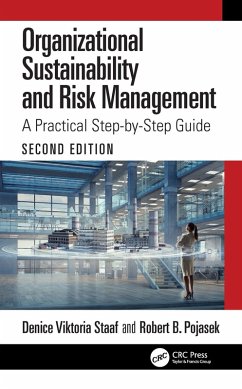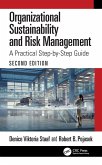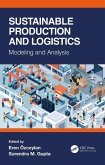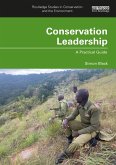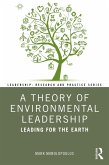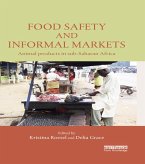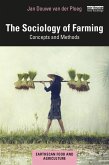Denice Viktoria Staaf, Robert B. Pojasek
Organizational Sustainability and Risk Management (eBook, PDF)
A Practical Step-by-Step Guide
78,95 €
78,95 €
inkl. MwSt.
Sofort per Download lieferbar

39 °P sammeln
78,95 €
Als Download kaufen

78,95 €
inkl. MwSt.
Sofort per Download lieferbar

39 °P sammeln
Jetzt verschenken
Alle Infos zum eBook verschenken
78,95 €
inkl. MwSt.
Sofort per Download lieferbar
Alle Infos zum eBook verschenken

39 °P sammeln
Denice Viktoria Staaf, Robert B. Pojasek
Organizational Sustainability and Risk Management (eBook, PDF)
A Practical Step-by-Step Guide
- Format: PDF
- Merkliste
- Auf die Merkliste
- Bewerten Bewerten
- Teilen
- Produkt teilen
- Produkterinnerung
- Produkterinnerung

Bitte loggen Sie sich zunächst in Ihr Kundenkonto ein oder registrieren Sie sich bei
bücher.de, um das eBook-Abo tolino select nutzen zu können.
Hier können Sie sich einloggen
Hier können Sie sich einloggen
Sie sind bereits eingeloggt. Klicken Sie auf 2. tolino select Abo, um fortzufahren.

Bitte loggen Sie sich zunächst in Ihr Kundenkonto ein oder registrieren Sie sich bei bücher.de, um das eBook-Abo tolino select nutzen zu können.
This new edition is completely revamped and reorganized to reflect changes in standards and regulations and to include all new topics related to organizational sustainability and risk management. The role that the Sustainable Development Goals (SDGs) play within the realm of organizational sustainability is one of many new topics.
- Geräte: PC
- ohne Kopierschutz
- eBook Hilfe
- Größe: 17.92MB
Andere Kunden interessierten sich auch für
![Organizational Sustainability and Risk Management (eBook, ePUB) Organizational Sustainability and Risk Management (eBook, ePUB)]() Denice Viktoria StaafOrganizational Sustainability and Risk Management (eBook, ePUB)78,95 €
Denice Viktoria StaafOrganizational Sustainability and Risk Management (eBook, ePUB)78,95 €![Sustainable Production and Logistics (eBook, PDF) Sustainable Production and Logistics (eBook, PDF)]() Sustainable Production and Logistics (eBook, PDF)51,95 €
Sustainable Production and Logistics (eBook, PDF)51,95 €![Conservation Leadership (eBook, PDF) Conservation Leadership (eBook, PDF)]() Simon BlackConservation Leadership (eBook, PDF)37,95 €
Simon BlackConservation Leadership (eBook, PDF)37,95 €![A Theory of Environmental Leadership (eBook, PDF) A Theory of Environmental Leadership (eBook, PDF)]() Mark ManolopoulosA Theory of Environmental Leadership (eBook, PDF)44,95 €
Mark ManolopoulosA Theory of Environmental Leadership (eBook, PDF)44,95 €![The Fukushima Daiichi Nuclear Power Station Disaster (eBook, PDF) The Fukushima Daiichi Nuclear Power Station Disaster (eBook, PDF)]() The Independent Investigation Fukushima Nuclear AccidentThe Fukushima Daiichi Nuclear Power Station Disaster (eBook, PDF)38,95 €
The Independent Investigation Fukushima Nuclear AccidentThe Fukushima Daiichi Nuclear Power Station Disaster (eBook, PDF)38,95 €![Food Safety and Informal Markets (eBook, PDF) Food Safety and Informal Markets (eBook, PDF)]() Food Safety and Informal Markets (eBook, PDF)40,95 €
Food Safety and Informal Markets (eBook, PDF)40,95 €![The Sociology of Farming (eBook, PDF) The Sociology of Farming (eBook, PDF)]() Jan Douwe van der PloegThe Sociology of Farming (eBook, PDF)37,95 €
Jan Douwe van der PloegThe Sociology of Farming (eBook, PDF)37,95 €-
-
-
This new edition is completely revamped and reorganized to reflect changes in standards and regulations and to include all new topics related to organizational sustainability and risk management. The role that the Sustainable Development Goals (SDGs) play within the realm of organizational sustainability is one of many new topics.
Dieser Download kann aus rechtlichen Gründen nur mit Rechnungsadresse in A, B, BG, CY, CZ, D, DK, EW, E, FIN, F, GR, HR, H, IRL, I, LT, L, LR, M, NL, PL, P, R, S, SLO, SK ausgeliefert werden.
Produktdetails
- Produktdetails
- Verlag: Taylor & Francis
- Seitenzahl: 222
- Erscheinungstermin: 14. Juli 2023
- Englisch
- ISBN-13: 9781000909999
- Artikelnr.: 68120092
- Verlag: Taylor & Francis
- Seitenzahl: 222
- Erscheinungstermin: 14. Juli 2023
- Englisch
- ISBN-13: 9781000909999
- Artikelnr.: 68120092
Denice Viktoria Staaf
Denice Viktoria Staaf found her way to sustainability through the green building movement. She has been an Accredited Professional under the Leadership in Energy and Environmental Design (LEED) Standard for over 20 years. She is passionate about sustainability for manufacturers and supply chains under the overall organizational sustainability umbrella. She believes that the systematic approach taught by Dr. Pojasek, outlined in this book, is the way forward for organizations to contribute to sustainable development positively. She graduated from Harvard University, earning a master's degree in Environmental Management & Sustainability with a concentration in the Built Environment.
Denice has recently focused on circularity as a deeper dive into organizational sustainability using the process approach to achieve results. She is a member of the Circular Transition Indicators (CTI) Framework Implementation Partners by the World Business Council for Sustainable Development (WBCSD) and recently joined the International Organization for Standardization (ISO) Technical Committee for the Circular Economy (TC 323).
Denice founded the consulting firm Labeling Sustainability in 2016 after helping companies of her friends with sustainability for fun; she loves organizational sustainability and being of service to manufacturers. Today, Labeling Sustainability is a global consulting firm and Type III Environmental Product Declaration Program Operator assisting international organizations with their sustainability documentation needs. Although the organization has grown from the days she did LCAs for her friends, Denice Viktoria Staaf still thinks sustainability is fun.
Robert B. Pojasek, PhD
Dr. Pojasek has been active in the reformatting of the corporate sustainability reporting by using the organizational structure that is presented in the first volume of this work, i.e., organizational sustainability." To make this happen, I have worked closely with Denice Viktoria Staaf, who has introduced herself above.
Dr. Pojasek has been interested in the organizational practice of organizational sustainability since the lead-up to the 1992 Earth Summit held in Rio de Janeiro. The United Nations was successful in convincing large companies to get involved in the concept of sustainability as the United States and Europe began introducing legislation on providing communities with clean air and water. Prior to this event, Dr. Pojasek had spent 12 years developing pollution prevention programs in the companies. The interest in "sustainability" and the experience of working with facilities to eliminate or reduce the "waste" in their operations was just beginning. However, consulting firms and university research was slow to develop. Consulting firms were focused on the permitting of processes, not on the elimination of their use.
Dr. Pojasek began teaching pollution prevention at Tufts University, with an eye on developing what people defined as "sustainability." He worked to build interest in this topic by publishing over 100 journal articles on the topic and inviting industry managers to take the courses that he was teaching at Tufts. In 200, he worked with several professors at the Harvard Extension School to develop a "master's degree program" that would require courses that he wanted to teach. The program began in 2002. Dr. Pojasek developed a course in "Organizational Sustainability" and taught that course for 20 years. He is still working hard to have more practical courses, books, and experiences with organizational sustainability that will soon be supplemented with "sustainable finance." That is the new frontier of this developing story. It is a little soon to be introducing volume 3 of this series. Maybe the first two volumes (volume 1 is in paperback) will convince you to work with corporations to make the changes to adopt the new formats for organizational and financial sustainabilty.
Denice Viktoria Staaf found her way to sustainability through the green building movement. She has been an Accredited Professional under the Leadership in Energy and Environmental Design (LEED) Standard for over 20 years. She is passionate about sustainability for manufacturers and supply chains under the overall organizational sustainability umbrella. She believes that the systematic approach taught by Dr. Pojasek, outlined in this book, is the way forward for organizations to contribute to sustainable development positively. She graduated from Harvard University, earning a master's degree in Environmental Management & Sustainability with a concentration in the Built Environment.
Denice has recently focused on circularity as a deeper dive into organizational sustainability using the process approach to achieve results. She is a member of the Circular Transition Indicators (CTI) Framework Implementation Partners by the World Business Council for Sustainable Development (WBCSD) and recently joined the International Organization for Standardization (ISO) Technical Committee for the Circular Economy (TC 323).
Denice founded the consulting firm Labeling Sustainability in 2016 after helping companies of her friends with sustainability for fun; she loves organizational sustainability and being of service to manufacturers. Today, Labeling Sustainability is a global consulting firm and Type III Environmental Product Declaration Program Operator assisting international organizations with their sustainability documentation needs. Although the organization has grown from the days she did LCAs for her friends, Denice Viktoria Staaf still thinks sustainability is fun.
Robert B. Pojasek, PhD
Dr. Pojasek has been active in the reformatting of the corporate sustainability reporting by using the organizational structure that is presented in the first volume of this work, i.e., organizational sustainability." To make this happen, I have worked closely with Denice Viktoria Staaf, who has introduced herself above.
Dr. Pojasek has been interested in the organizational practice of organizational sustainability since the lead-up to the 1992 Earth Summit held in Rio de Janeiro. The United Nations was successful in convincing large companies to get involved in the concept of sustainability as the United States and Europe began introducing legislation on providing communities with clean air and water. Prior to this event, Dr. Pojasek had spent 12 years developing pollution prevention programs in the companies. The interest in "sustainability" and the experience of working with facilities to eliminate or reduce the "waste" in their operations was just beginning. However, consulting firms and university research was slow to develop. Consulting firms were focused on the permitting of processes, not on the elimination of their use.
Dr. Pojasek began teaching pollution prevention at Tufts University, with an eye on developing what people defined as "sustainability." He worked to build interest in this topic by publishing over 100 journal articles on the topic and inviting industry managers to take the courses that he was teaching at Tufts. In 200, he worked with several professors at the Harvard Extension School to develop a "master's degree program" that would require courses that he wanted to teach. The program began in 2002. Dr. Pojasek developed a course in "Organizational Sustainability" and taught that course for 20 years. He is still working hard to have more practical courses, books, and experiences with organizational sustainability that will soon be supplemented with "sustainable finance." That is the new frontier of this developing story. It is a little soon to be introducing volume 3 of this series. Maybe the first two volumes (volume 1 is in paperback) will convince you to work with corporations to make the changes to adopt the new formats for organizational and financial sustainabilty.
1. The Path to Organizational Sustainability. 2. Organizational Risk
Management. 3. Decision Making. 4. Organizational Objectives and
Leadership. 5. Organization's Internal and External Context. 6. Engagement
with Stakeholders and Social License to Operate. 7. Organizational
Governance. 8. Uncertainty Assessment of Opportunities and Threats. 9.
Sustainable Processes and Operations. 10. Organization's Support
Operations. 11. Organizational Sustainability. 12. Implementation is Doing.
13. Monitoring in Organizations. 14. Sustainability Frameworks and ESG
Reporting. 15. Organization Self-Assessment and Maturity. 16. Improvement,
Innovation, and Learning. 17. Organizational Resilience.
Management. 3. Decision Making. 4. Organizational Objectives and
Leadership. 5. Organization's Internal and External Context. 6. Engagement
with Stakeholders and Social License to Operate. 7. Organizational
Governance. 8. Uncertainty Assessment of Opportunities and Threats. 9.
Sustainable Processes and Operations. 10. Organization's Support
Operations. 11. Organizational Sustainability. 12. Implementation is Doing.
13. Monitoring in Organizations. 14. Sustainability Frameworks and ESG
Reporting. 15. Organization Self-Assessment and Maturity. 16. Improvement,
Innovation, and Learning. 17. Organizational Resilience.
1. The Path to Organizational Sustainability. 2. Organizational Risk
Management. 3. Decision Making. 4. Organizational Objectives and
Leadership. 5. Organization's Internal and External Context. 6. Engagement
with Stakeholders and Social License to Operate. 7. Organizational
Governance. 8. Uncertainty Assessment of Opportunities and Threats. 9.
Sustainable Processes and Operations. 10. Organization's Support
Operations. 11. Organizational Sustainability. 12. Implementation is Doing.
13. Monitoring in Organizations. 14. Sustainability Frameworks and ESG
Reporting. 15. Organization Self-Assessment and Maturity. 16. Improvement,
Innovation, and Learning. 17. Organizational Resilience.
Management. 3. Decision Making. 4. Organizational Objectives and
Leadership. 5. Organization's Internal and External Context. 6. Engagement
with Stakeholders and Social License to Operate. 7. Organizational
Governance. 8. Uncertainty Assessment of Opportunities and Threats. 9.
Sustainable Processes and Operations. 10. Organization's Support
Operations. 11. Organizational Sustainability. 12. Implementation is Doing.
13. Monitoring in Organizations. 14. Sustainability Frameworks and ESG
Reporting. 15. Organization Self-Assessment and Maturity. 16. Improvement,
Innovation, and Learning. 17. Organizational Resilience.
